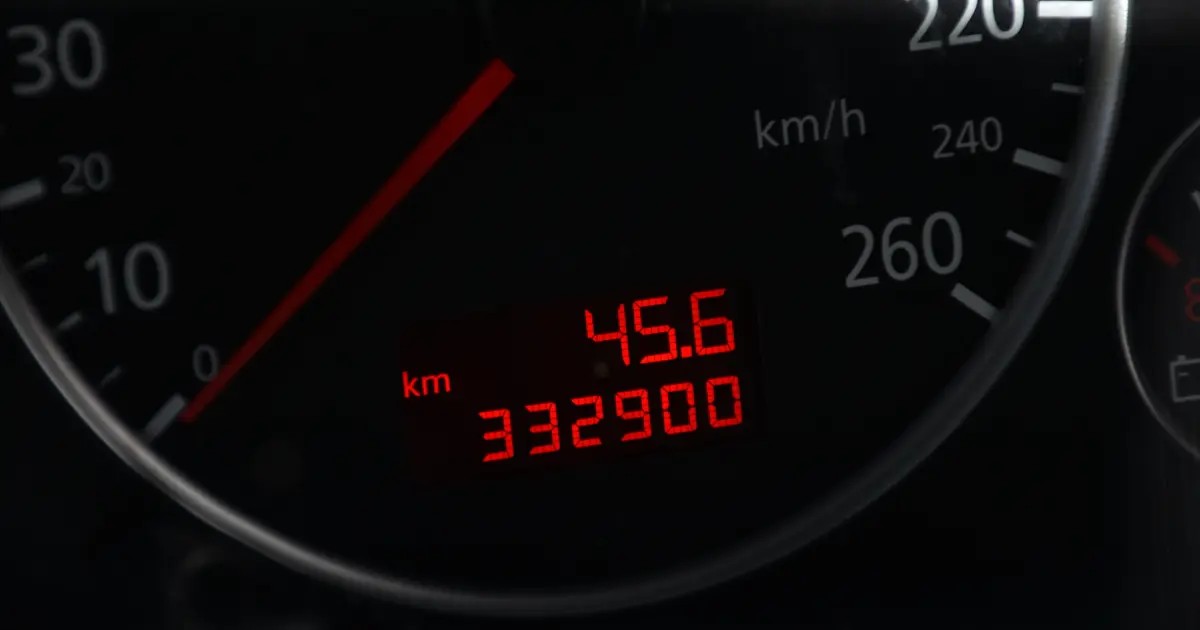Can Odometer Be Reset? Yes, an odometer can be reset, but it’s crucial to understand the legal and ethical implications. CAR-TOOL.EDU.VN provides expert insights into odometer tampering, its consequences, and how to protect yourself. Discover the realities of odometer manipulation, your legal protections, and resources for safe car buying. Learn more about odometer rollback detection, mileage correction tools, and ethical considerations in vehicle sales.
Contents
Table of Contents
- Understanding Odometer Resetting
- Reasons for Odometer Tampering
- The Significance of Mileage
- Legality of Odometer Resetting
- Detecting Odometer Manipulation
- Actions to Take If You Suspect Fraud
- Mileage Correction Tools: Ethical Use
- FAQ: Odometer Resetting
- Conclusion
1. Understanding Odometer Resetting
What is involved in odometer resetting and what are the fundamental aspects of this practice? Odometer resetting involves altering the mileage displayed on a vehicle’s odometer. The odometer, typically found in the instrument cluster, records the total distance a vehicle has traveled. While some may consider resetting for legitimate reasons like instrument cluster replacement, it is often associated with fraudulent activities, particularly to increase a vehicle’s perceived value during resale. According to a study by the National Highway Traffic Safety Administration (NHTSA), odometer fraud costs American consumers over $1 billion annually. This includes instances of mileage rollback, where digital odometers are manipulated to show lower mileage, or odometer replacement, where a new instrument cluster is installed with incorrect mileage. Understanding these methods is crucial for both buyers and sellers in the automotive market.
 Odometer Reset
Odometer Reset
2. Reasons for Odometer Tampering
What are the primary motivators behind odometer tampering and what circumstances drive this unethical behavior? The reasons for odometer tampering often boil down to financial gain. Reducing the displayed mileage can significantly increase a vehicle’s market value. According to data from CARFAX, vehicles with altered odometers sell for an average of $4,000 more than they are actually worth. This practice is especially tempting for those looking to quickly sell a used car or for unscrupulous dealerships aiming to maximize profits. While less common, some individuals might attempt to reset an odometer after an instrument cluster malfunction or replacement. However, even in these cases, proper documentation and disclosure are essential to avoid any legal repercussions. The key takeaway is that any alteration to a vehicle’s odometer should be approached with caution and full transparency, as highlighted by the experts at CAR-TOOL.EDU.VN.
3. The Significance of Mileage
Why is mileage so important in assessing a vehicle’s value and what does it truly indicate about its condition? Mileage serves as a primary indicator of a vehicle’s age, wear, and potential maintenance needs. Lower mileage generally suggests less wear and tear on critical components like the engine, transmission, and suspension. This perception often translates into a higher resale value. However, as noted by Consumer Reports, mileage is just one factor to consider. A well-maintained vehicle with higher mileage might be a better purchase than a poorly maintained one with lower mileage. Factors such as service history, driving conditions, and overall vehicle condition should also be taken into account. CAR-TOOL.EDU.VN emphasizes a holistic approach to evaluating used vehicles, advising buyers to look beyond the odometer reading and conduct thorough inspections and research.
4. Legality of Odometer Resetting
What are the legal ramifications of odometer resetting and what laws govern this practice? Odometer resetting is illegal in the United States and many other countries. Federal law prohibits tampering with a vehicle’s odometer with the intent to defraud. Violators can face substantial fines and even imprisonment. According to Title 49 of the United States Code, Section 32703, it is illegal to “disconnect, reset, alter, or have disconnected, reset, or altered, an odometer of a motor vehicle with intent to change the mileage registered by the odometer.” The penalties for violating this law can include civil fines of up to $10,000 per violation and criminal charges with potential prison sentences. In addition to federal law, many states have their own specific laws addressing odometer fraud. CAR-TOOL.EDU.VN advises anyone considering altering an odometer to seek legal counsel and fully understand the potential consequences.
5. Detecting Odometer Manipulation
How can you identify if an odometer has been tampered with and what are the key indicators to look for? Detecting odometer manipulation requires a keen eye and attention to detail. Common signs include:
- Inconsistencies in Wear and Tear: Check for wear on the pedals, seats, and steering wheel that doesn’t match the displayed mileage.
- Loose or Missing Dashboard Screws: These can indicate that the instrument cluster has been tampered with.
- Scratches or Damage on the Odometer Lens: This suggests that someone may have tried to roll back the odometer.
- Service Records Discrepancies: Compare the odometer readings on service records with the current mileage.
- CARFAX or AutoCheck Reports: These reports can reveal mileage discrepancies reported to state agencies or insurance companies.
According to the National Automobile Dealers Association (NADA), a pre-purchase inspection by a qualified mechanic can also help uncover hidden signs of odometer tampering. CAR-TOOL.EDU.VN recommends using a combination of these methods to thoroughly assess a vehicle’s history and condition.
 Importance of miles
Importance of miles
6. Actions to Take If You Suspect Fraud
What steps should you take if you suspect odometer fraud and what resources are available to assist you? If you suspect that you have been a victim of odometer fraud, it is crucial to take immediate action. First, gather all relevant documentation, including the vehicle’s title, sales agreement, service records, and any communication with the seller. Next, file a complaint with the National Highway Traffic Safety Administration (NHTSA). NHTSA investigates odometer fraud and can take action against perpetrators. You should also contact your state’s Department of Motor Vehicles (DMV) or consumer protection agency to report the suspected fraud. Additionally, consider consulting with an attorney experienced in odometer fraud cases. An attorney can help you understand your legal options and pursue a claim against the seller. According to the National Consumer Law Center (NCLC), victims of odometer fraud may be entitled to damages, including the difference between the price paid and the actual value of the vehicle, as well as punitive damages. CAR-TOOL.EDU.VN urges consumers to be proactive in protecting themselves from odometer fraud and to seek legal recourse when necessary.
7. Mileage Correction Tools: Ethical Use
How are mileage correction tools used ethically and what are the legitimate applications of these devices? Mileage correction tools, also known as odometer correction tools or mileage programmers, are designed to adjust the mileage displayed on a vehicle’s odometer. While these tools are often associated with odometer fraud, they do have legitimate applications. For example, when an instrument cluster fails and needs to be replaced, a mileage correction tool can be used to program the new cluster with the correct mileage. Similarly, if a vehicle’s engine or transmission is replaced, it may be necessary to adjust the odometer to reflect the new components’ mileage. However, it is crucial to use these tools ethically and in accordance with the law. Any alteration to a vehicle’s odometer should be documented and disclosed to potential buyers. According to the Automotive Service Association (ASA), technicians who perform mileage correction services should adhere to strict ethical guidelines and maintain detailed records of all adjustments. CAR-TOOL.EDU.VN emphasizes the responsible use of mileage correction tools and encourages transparency in all vehicle transactions.
8. FAQ: Odometer Resetting
- Is it possible to reset a digital odometer?
Yes, digital odometers can be reset using specialized tools and software. However, doing so with the intent to defraud is illegal. - What is the penalty for odometer fraud?
Penalties can include fines of up to $10,000 per violation and imprisonment. - How can I check if a car’s mileage is accurate?
Check service records, CARFAX reports, and have a mechanic inspect the vehicle. - Can a mechanic tell if an odometer has been rolled back?
Yes, a qualified mechanic can often detect signs of odometer tampering during a pre-purchase inspection. - What should I do if I suspect odometer fraud after buying a car?
Report the fraud to NHTSA, your state’s DMV, and consult with an attorney. - Are there any legitimate reasons to reset an odometer?
Yes, such as when replacing a faulty instrument cluster, but it must be properly documented. - How do mileage correction tools work?
They connect to the vehicle’s computer system and allow technicians to adjust the odometer reading. - Is it legal to own a mileage correction tool?
Yes, but using it to commit fraud is illegal. - What is the role of CARFAX in detecting odometer fraud?
CARFAX reports can reveal mileage discrepancies reported to state agencies or insurance companies. - How can I protect myself from odometer fraud when buying a used car?
Be diligent, ask questions, inspect the vehicle thoroughly, and obtain a vehicle history report.
9. Conclusion
Understanding the intricacies of odometer resetting is essential for both buyers and sellers in the automotive market. While mileage correction tools have legitimate uses, odometer tampering remains a serious issue with significant legal and ethical implications. By being informed, diligent, and proactive, consumers can protect themselves from odometer fraud and make informed decisions when buying used vehicles. CAR-TOOL.EDU.VN is committed to providing expert resources and guidance to help you navigate the complexities of the automotive world. For more information, visit our website at CAR-TOOL.EDU.VN or contact us at 456 Elm Street, Dallas, TX 75201, United States. You can also reach us via Whatsapp at +1 (641) 206-8880.
Searching for detailed information on a specific auto part or repair tool can be overwhelming. At CAR-TOOL.EDU.VN, we simplify the process by offering comprehensive specifications, brand comparisons, and user reviews, making your search easier and more efficient.
Ready to find the perfect auto parts and tools? Contact us via Whatsapp at +1 (641) 206-8880 for expert guidance and immediate answers to your questions. Let CAR-TOOL.EDU.VN help you make the best choice for your automotive needs!